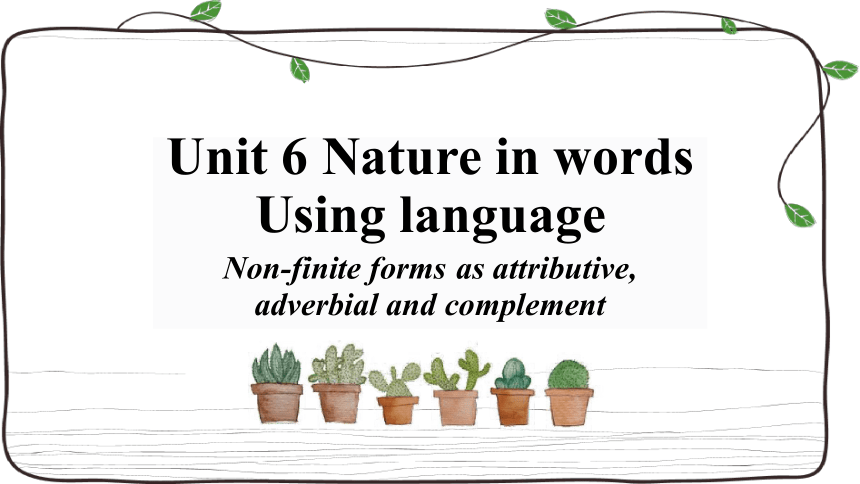(
课件网) Unit 6 Nature in words Using language Non-finite forms as attributive, adverbial and complement Learning objectives 1. To review the usage of non-finite forms as attributive, adverbial and complement; 2. To use non-finite forms as attributive, adverbial and complement. 非谓语动词作补语 1. 非谓语动词作感官动词的宾补 I heard him _____ an English song just now. I heard him _____ an English song when I passed by the room just now. I heard an English song _____ by a little girl just now. 一感:feel 二听:hear, listen to 五看:see, watch, notice, observe, look at singing sing sung The missing boy was last seen ____ by the river. A. playing B. to be playing C. to play D. play The plan which we would like to see ___ soon needs improving. A. carried out B. to carry out C. carry out D. to be carried out A A 2. 非谓语动词作使役动词的宾补 1) make/have/let sb. do让…做 get sb. to do Mother had me _____(go) to the shop and buy some salt. 2) have/leave/keep sb. doing 让…一直做 get sb. doing 让…开始做 I am sorry to have you _____.(wait) The teacher got us _____(move) our desks on hearing the bell. 3) make/have/get/keep sth. done 让…做;遭受损失 I will have/ get my bike _____.(repair) 4) leave sth. undone/to be done Please excuse me if I have left any of your questions _____(answer). repaired waiting moving go unanswered The boy was made _____ (make) wash the truck as a punishment. to make 主动语态中用不带to的不定式作补语,但在被动语态中要加上to 3. 非谓语动词作动词find, catch的宾补 find + sb. + doing find + sb./sth. + done catch + sb. + doing Exercise 1. I found them _____ (seat) at the table. 2. I found them _____ (seat) themselves at the table. 3. He looked around and caught a man _____ (put) his hand into the passenger’s pocket. 发现……正在做某事 发现……已经被做…… 发现……正在做某事 seated seating putting 非谓语动词作定语 1. 现在分词、过去分词和不定时作定语表示不同的时间关系。 We are all looking forward to the bridge _____ across the river next year. The bridge _____ (build) across the river last year brought us a lot of convenience. The bridge _____ (build) across the river now will have been completed by the end of this year. 2. 分词作定语 boiling water _____ boiled water _____ falling leaves _____ fallen leaves _____ developing countries _____ developed countries _____ to be built 被动、将来 built 被动、完成 being built 被动、进行 开水 凉白开 正在飘落的叶子 落叶 发展中国家 发达国家 3. 动名词作定语:说明被修饰词的_____ a fishing net = a net _____ fishing a swimming pool = a pool _____ swimming a walking stick = a stick _____ walking 对比:a sleeping boy = a boy _____ sleeping 用途,功能 for for for who is 4. 不定式作定语 1) to do与其修饰的名词构成逻辑上的_____关系 I have some clothes to wash. He has something important to tell you. 比较: I have a letter _____ (post), so I can’t go swimming with you. I have a letter _____ (post). Can you help me 思考: The Browns have a comfortable ho ... ...

